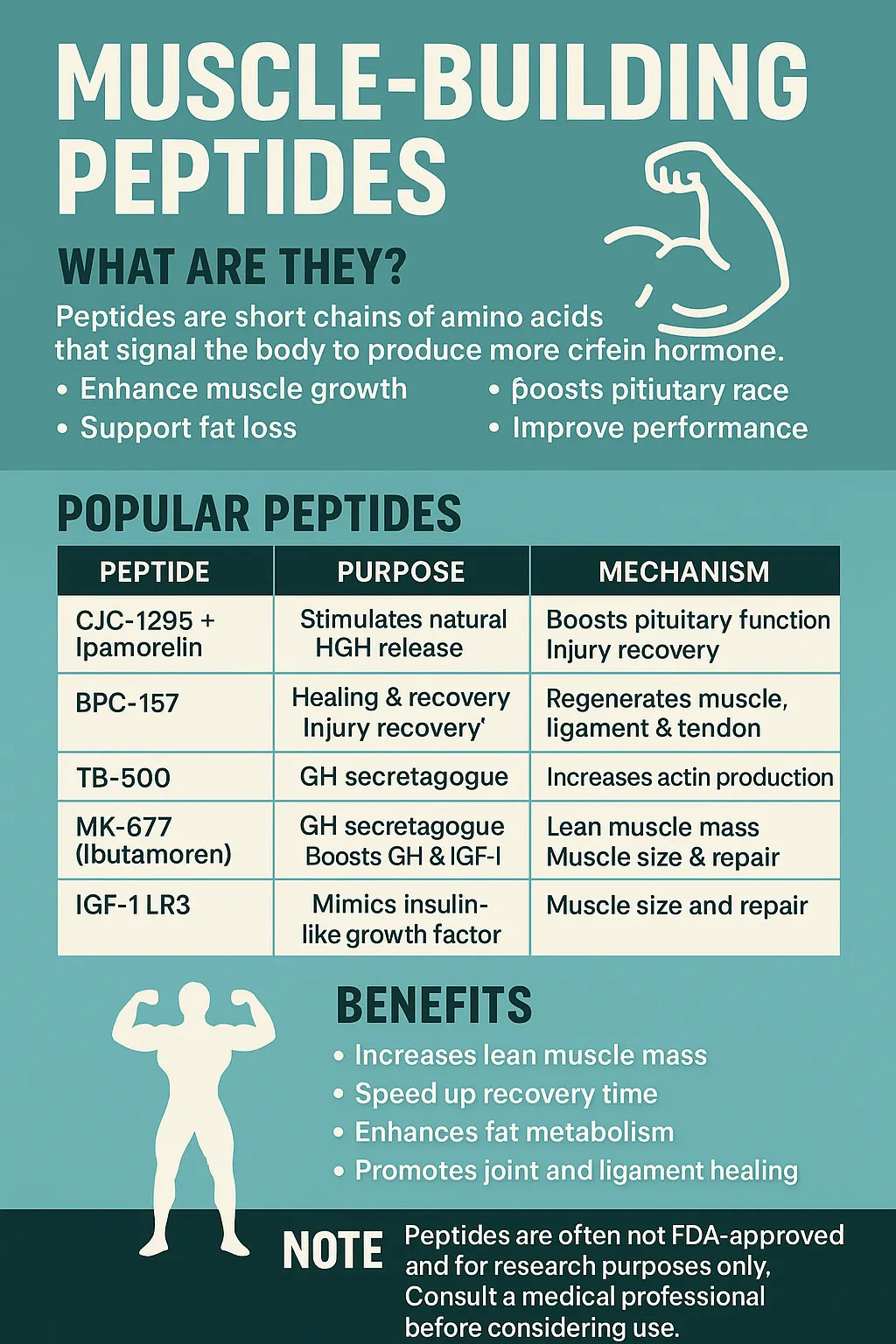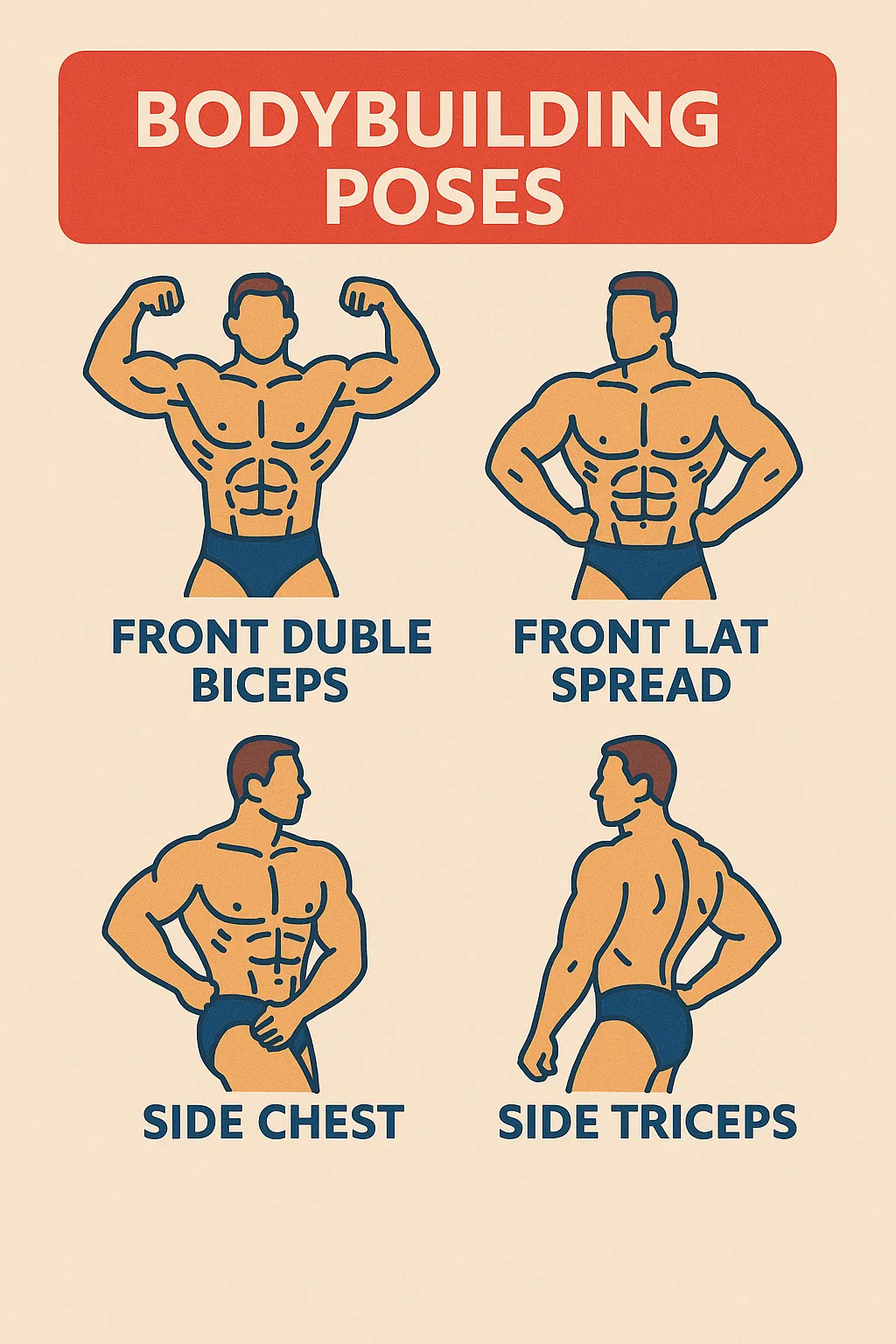Supplement firms frequently claim that peptides can boost muscle gain and aid in fat loss. However, few research have investigated the effects of peptides on bodybuilding.

Certain types are even prohibited in professional sports. Peptides are a popular performance-boosting supplement in the bodybuilding community. Growth hormone secretagogues (GHS) are a form of peptide that has sparked considerable interest.
Bodybuilders are athletes that aim to change their body composition as soon and efficiently as possible. This explains why many people use supplements or other assistance to achieve their training and physical goals (1Trusted Source).
Peptides are frequently viewed as a more natural alternative to anabolic steroids, with many praising their ability to increase muscle mass, stimulate fat reduction, and assist bodybuilders in getting the most out of their exercises.
This article covers all you need to know about peptides for bodybuilding, including their safety and efficacy.
What are Peptides?
Peptides, particularly GHSs, are short chains of amino acids, which are small molecules that provide as the foundation for peptide and protein formation.
Peptides are naturally occurring in the body, but they can also be found in animal or plant protein sources such as meat, fish, dairy, eggs, beans, lentils, and whole grains.
Manufacturers can isolate or create these peptides by mixing individual amino acids (2, 3Trusted Source). The structure of peptides is comparable to that of various hormones or message molecules found in your body. Many also can permeate tissues (4Trusted Source).
These short chains of amino acids are involved in a multitude of functions in your body, including in the creation of hormones and DNA. They are also beneficial for muscle tissue growth, which is why bodybuilders use them (1Trusted Source, 5, 6Trusted Source, 7Trusted Source, 8Trusted Source).
Supplement Forms
Peptide supplements are available in powder form, which can be mixed with a drink and consumed orally. Alternatively, you can have them in injectable form.
Peptides are short chains of amino acids found naturally in foods and the body. Manufacturers can extract them from natural sources or synthesise them chemically. These supplements can be taken orally or injected directly into the body.
What Do Peptides Do in the Body?
These are what peptides do to us:
Hormonal Interaction
Because peptides have structures comparable to several hormones and messaging molecules in the body, they can interact with and activate multiple receptors throughout the body, regulating a wide range of physical activities (5).
Health Benefits
Depending on their sequence and composition, certain peptides may help avoid blood clots, enhance the immune system, protect cells from harm, and lower cholesterol, inflammation, and blood pressure (2).
Impact on Bodybuilders
Specific peptides may also increase the production of hormones that promote muscle growth, body fat loss, and exercise performance and recuperation. This makes them especially enticing to bodybuilders looking to improve their training outcomes (1Trusted Source, 6Trusted Source).
Peptides can activate numerous receptors throughout the body. This encourages the release of hormones and other message molecules, which may have an impact on your health, body composition, exercise performance, and recuperation.
How Do They Work in Bodybuilding?
GHS and Muscle Growth
Bodybuilders often want to change their body composition as rapidly and efficiently as feasible. According to research, some peptides may assist patients reach their aims.
Growth hormone secretagogues (GHS) are a class of peptides that are particularly appealing to bodybuilders because they can promote the generation and release of human growth hormone.
Role of HGH and IGF-1
The pituitary gland secretes human growth hormone (HGH). It can aid with muscle building and fat loss (7Trusted Source).
It accomplishes this, in part, by causing the liver to generate insulin-like growth factor-1 (IGF-1). In turn, IGF-1 promotes muscle protein synthesis and growth. It also appears to indirectly aid in the breakdown of body fat.
In the 1980s, HGH was a popular performance-enhancing substance among amateur and professional sports, especially bodybuilders (6Trusted Source, 7Trusted Source).
However, because to safety concerns, regulating authorities such as the International Olympic Committee outlawed off-label usage of HGH beginning in 1989 (7Trusted Source).
Popularity of GHS as an Alternative
People believe GHSs provide much of the same benefits as HGH, but with less adverse effects. This could explain their appeal as a replacement for HGH among bodybuilders (9Trusted Source, 10Trusted Source).
To date, studies indicates that GHS stimulates the release of HGH or IGF-1 in humans. However, few research have looked into whether consuming GHS causes major changes in body composition, exercise performance, or recovery (10Trusted Source).
Need for More Research
Furthermore, no research have investigated the impact of GHSs on well-trained persons. More research is needed to evaluate whether GHSs have any tangible benefits for bodybuilders. As a result, scientists do not yet know which muscle areas peptides may effect the most or which routines they are most suited for (11Trusted Source).
Growth hormone secretagogues (GHS) are a popular alternative to HGH in the bodybuilding scene. However, no research has demonstrated that GHSs are useful for bodybuilding.
Peptide Types for Bodybuilding
Commonly Used GHS Peptides
Bodybuilders may be especially interested in peptides called growth hormone secretagogues (GHS).
The most prevalent GHSs used by bodybuilders are:
• Growth hormone-releasing hormones, such as sermorelin, tesamorelin, CJC-1293, and CJC-1295.
• Ghrelin and compounds that replicate its actions: lenomorelin, anamorelin, ipamorelin, macimorelin, and tabimorelin.
• Growth hormone-releasing peptides (GHRPs) include alexamorelin, GHRP-1, GHRP-2, GHRP-3, GHRP-4, GHRP-5, GHRP-6, and hexarelin.
Each of these peptides stimulates HGH production and release, albeit in slightly different ways (9Trusted Source and 10Trusted Source).
Marketing and Anecdotal Use
Manufacturers frequently promote each category for slightly different reasons. However, no research have been conducted to explore the effects of GHSs on bodybuilders or other well-trained individuals. As a result, indications and suggested dosages are often based on anecdotal evidence rather than science.
GHS peptides can boost HGH secretion, potentially increasing muscular growth and fat loss. Despite the present popularity of peptides among bodybuilders, experts must conduct additional research to discover whether they function.
Safety
Lack of Long-Term Data
According to existing literature, the safety of utilising GHSs in the short and long term is unknown. Small and short-term studies have been conducted to investigate their safety. As a result, scientists must conduct significantly more research into the safety of GHS (10Trusted Source, 11Trusted Source).
Side Effects
Common side effects of GHS use include increased hunger, high blood sugar levels, and fluid retention. GHSs may also reduce the body’s sensitivity to insulin, making it more difficult to maintain appropriate blood sugar levels (10Trusted Source).
Contamination Risks
People who inject GHS with non-sterile needles may likewise be at risk of contamination.
Regulatory Status
To now, the Food and Drug Administration (FDA) has only licensed a few varieties of GHS to treat certain medical ailments on a prescription basis. GHSs are also in the World Anti-Doping Agency’s list of banned drugs (7Trusted Source, 11Trusted Source).
Unregulated Use
Despite this, many GHSs may be purchased from supplement websites without a prescription (10Trusted Source).
Doing so may be harmful, as their long-term safety is unknown, and it is nearly hard to assess the quality of the acquired supplement. For these reasons, using GHSs off-label or without a prescription is not safe.
GHS peptides may stimulate hunger and blood sugar levels, as well as cause fluid retention. Their long-term safety is questionable, and off-label usage may be hazardous.
Final Thoughts
Peptides are frequently touted by supplement makers as helping to increase muscle building, stimulate fat reduction, and improve workout performance and recovery.
However, robust research does not support many of these statements. There is very little information on the impact of peptides in highly trained individuals, such as bodybuilders.
Furthermore, GHS peptides are currently prohibited doping agents in professional sports, and little is known regarding their long-term safety. Using them may also create health problems, and they are presently only approved to treat a few particular medical issues. For all of these reasons, bodybuilders should avoid taking GHS peptides off-label or without a prescription.







